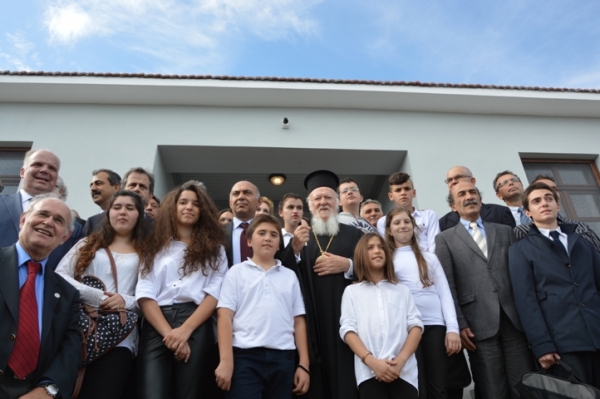Over its long history, HGM Vatopaidi has made an important contribution to education through significant activities and initiatives such as the renovation, reconstruction and refoundation of schools, or through the award of scholarships to support post-graduate or doctoral candidate students in their research. This is in addition to providing material and technical support to schools and faculties. The Monastery also shows great interest in the needs of Greek language learning, because teaching Greek gives those abroad the opportunity to keep their mother tongue as a means of living communication and connection with their tradition and homeland. At the same time, learning Greek is also important for all those who wish, either through personal interest or professional activity, to come into contact with the original texts of the Gospels and Patristic and Ecclesiastical literature, as well as works produced in ancient Greece.

As an example, we would mention the contribution of the Monastery to the renovation and refoundation of the school on the island of Imvros.
The Monastery has also contributed to the promotion of the Theological School of Halki and the need for it to start functioning again. It has done so by producing a documentary, under the auspices of the ‘Pemptousia.gr’ website, entitled: ‘Halki: Between Two Worlds’. This documentary sets out the vision for the future of this historic theological school, while it also records the initiatives and concern of the brotherhood for a school that would be open to all. In a transitionary period for the history of such institutions, Halki continues to be a beacon of culture and Orthodoxy, while, through the active brotherhood and the responsible oversight of Metropolitan Elpidoforos of Prousa, every day that passes is the dawn of new hope for Halki.
Cataloguing, conservation and digitalization of the library
If the treasures reflect the splendour and riches of Athonite culture over the centuries, the libraries attest to its scholarly aspect and the interest of the Athonite fathers in both divine and human knowledge. So, apart from the wall-paintings and the portable icons, the Holy Mountain is also in possession of more than 12,000 manuscripts, written on parchment or paper. The wealth of documents, manuscript codices and printed books which is held in the libraries of the monasteries of the Holy Mountain is most impressive.
The material kept in the Vatopaidi library is a valuable source for the history of the monasteries and, indeed, for Byzantine and Post-Byzantine society in general. The books in the Monastery can be divided into liturgical, secular and theological, and are either in the form of manuscripts or printed books. These collections have been badly damaged or, ravaged over the course of the centuries, either because of time itself, fires, invaders or other depredations.
HGM Vatopaidi is among the Monasteries with the largest libraries and also has an archive very rich in resources concerning its history- chrysobulls, sigillia and argyrobulls, as well as documents of all kinds, most of them in Greek, though there is also a large number written in languages from other regions within the Byzantine realm.
More than 2,500 manuscripts and 40,000 printed books, which date from the beginning of the printing-press, provide evidence of the unwavering interest in literature on the part of the fathers of Vatopaidi. The Monastery library undoubtedly contains one of the most significant collections of manuscripts, documents and vintage books anywhere in Greece.
Manuscripts from ancient literature, and Patristic thought and theology, many copied in the Monastery’s scriptorium, were accumulated, studied and have been preserved to this day. They are most impressive as regards both their content and their ornamentation.
Through the Athoniada School an effort will be made to digitalize and document the works of art, to conserve them and to produce digital catalogues to assist in searching the material and promoting research and training through particular academic programme. This will be effected through collaboration with universities and specialist scholars and afford young scholars the opportunity to take part.